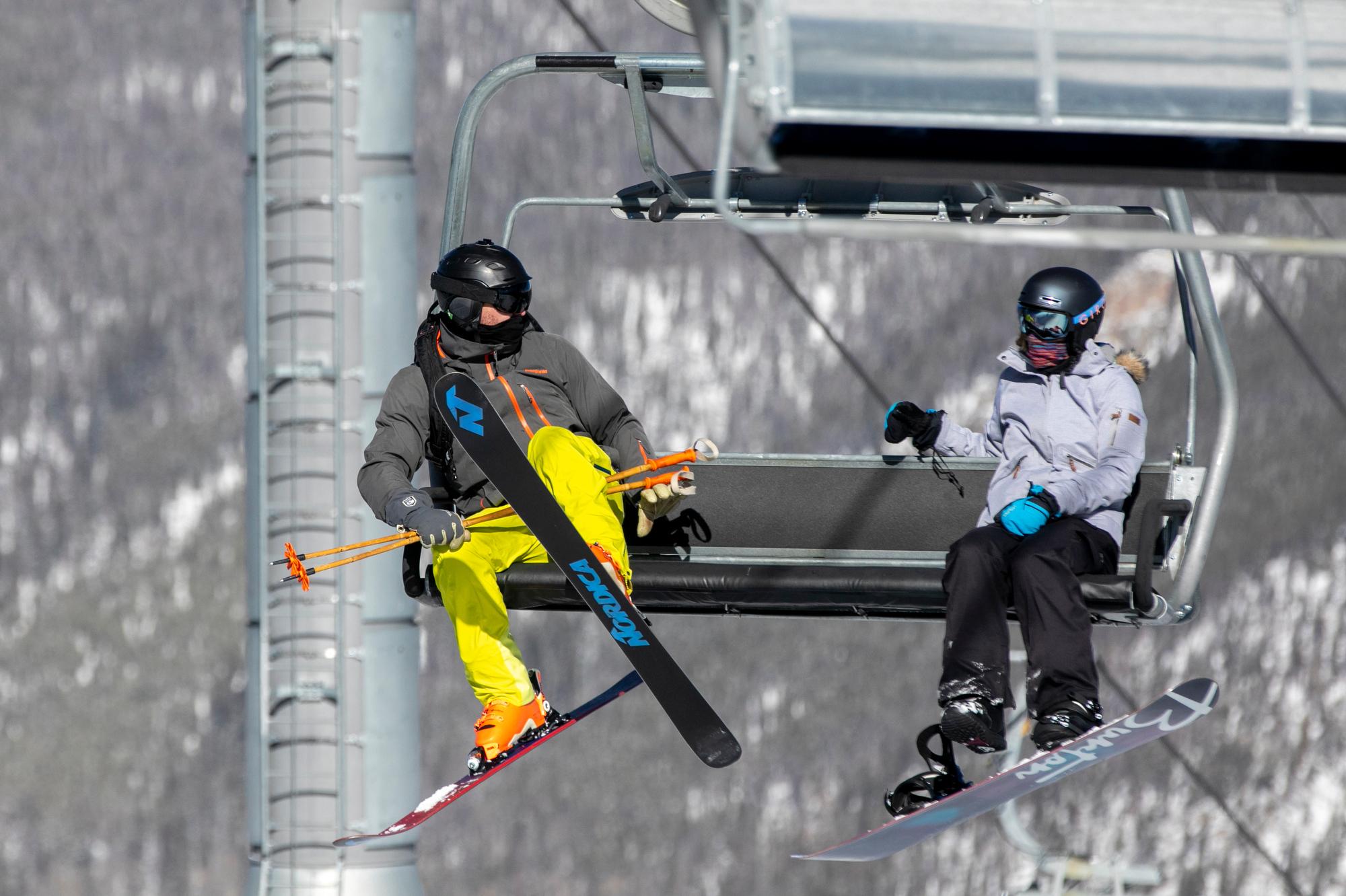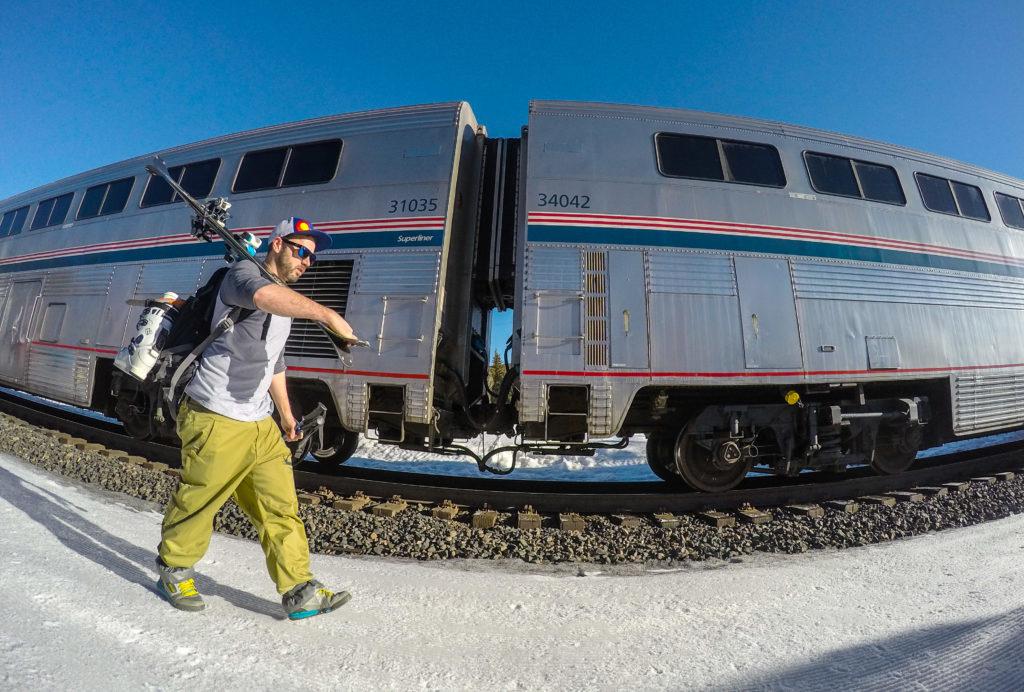
Skiing is big business in Colorado and, when it comes to resorts, Alterra Mountain Company is one of the biggest there is.
Based in Denver, Alterra manages Steamboat and Winter Park in addition to more than a dozen other mountains just in North America. Jared Smith, CEO at Alterra, joined Colorado Matters and spoke with Ryan Warner about climate change, worker housing and the push for mega passes like Ikon.
This interview has been edited for length and clarity
Affordable employee housing
Ryan Warner: I want to start with worker housing. What is Alterra's responsibility when it comes to affordable housing in these mountain communities?
Jared Smith: Yeah. We certainly have one. We certainly have one that we take really seriously. It's always been expensive to live in destination towns or resort towns but really, since COVID, with the advent of work from home and a lot of the flexible work schedules, an already difficult living environment has gotten even more squeezed.
Warner: A kind of COVID crunch. How do you address that as a ski company?
Smith: So, to the responsibility part of that, we go from 7,000 employees that are full-time year-round to about 24,000 full-time year-round over the course of the season. And the vast majority of those are people who need a place to live. We have taken a really, really aggressive approach to it over the last two or three years, in everything from converting hotels to workforce housing to master leasing apartment buildings or hotels, and then we've poured a lot of money into building from the ground up some workforce housing that we think is best of breed.
Warner: Does that mean that Alterra owns buildings?
Smith: We own a lot of housing.
Warner: Okay. And is that growing, that portfolio?
Smith: It is. In fact, two years ago, we set a goal for ourselves to double the amount of beds that we have available, or rooms that we have available, for employee housing across the portfolio, and we have. We started with thousands, and we're looking to double that number over the next couple of years.
Warner: I mean, it's fascinating to me that you're as much a housing company as a skiing company, to some extent. Do you think that's true?
Smith: I don't know that that's entirely true. But I would say that housing is as big a part of our operation as any of the other things that we do, right? These ski resorts are communities and little cities in and of themselves. We are, in many cases, we're the housing, we're the retail shop, we're the food and beverage shop. We have huge maintenance capabilities and facilities. In many cases, sometimes, not in Colorado, but in others, we may be the water company. We may be the electric company.
Warner: Wow. The company town.
Smith: They are definitely company towns.
Warner: Take us on the ground to a community. In Winter Park, I know you've built new units for sure.
Smith: Winter Park is our most recent workforce housing project, and candidly, a test case for trying to do it from the ground up.
Warner: That is building the housing?
Smith: Literally building the housing. As opposed to converting or leasing apartments. So, 300 beds across two buildings, but that is fit-for-purpose, purpose-built. Every bed has a door. Really, really nice top of the line workforce housing in the industry.
Climate change
Warner: Okay. Climate change now. Even if your company were 100% renewable, the very picture of sustainability, Jared, so many of the inputs are carbon-intensive. So, I'm thinking namely of the cars and planes that get people to your resorts. How do you see your responsibility beginning and ending?
Smith: Yeah, so you're right on, that if we could wave a magic wand tomorrow and say we are not producing any carbon at our resorts, that would not be enough. So, that is the start of our responsibilities, to make sure that our operations in and of themselves are done responsibly, that we are participating in the green-ification of maintenance facilities and trucks and all of the things that we do, and we're doing that pretty seriously and recently announced some goals around carbon neutrality in 2030 and a commitment to get on 100% renewable energy in our operations by 2030.
To your other point, the induced travel, what is the carbon footprint of cars and planes that come to participate in the resorts or to ski at our places? It's obviously a much more complex answer for us. The number one thing that we can do is take care of our own emissions, and then from there, the greatest thing we can do is try and advocate for responsible travel and encourage EV use.
Warner: What does that look like?
Smith: For us, it looks like on-site availability of charging stations wherever we can, opportunities to use non-traditional travel like trains wherever we can. And we have a unique opportunity here in Colorado to do that, (we’ve) been working with the governor's office and the state on their plans to use old commercial lines and turn that into passenger rail opportunities.
Warner: Particularly reaching Steamboat.
Smith: Winter Park and Steamboat and some others along the way. So, that's a big initiative of ours.
Warner: So, there's a kind of lobbying when it comes to transportation that feeds in?
Smith: Yeah. So, it's the stuff that we control, the stuff that we can contribute to, and then the advocacy that we can do on behalf of the stuff that is over and above that.
Warner: Could you imagine ski resorts lobbying for more efficient planes or better fuels? I really am trying to understand. The scope could go so far, Jared. You know what I mean?
Smith: Yeah. Yeah. I think generally, good climate legislation is comprehensive, and it can be advocacy or legislation that encourages more efficient travel. Trains is a good example of that. More efficient fuel usage, more efficient water usage. We've got targets to reduce and become more efficient with our own water usage. What we're advocating for is for good, common sense climate legislation at the local, state, and federal level, and whether or not that is directly related to resorts I think is a little bit nuanced. We are encouraged by anything that is common sense that's going to help the world stay below those thresholds.
Diversifying the industry
Warner: Winter Park debuted a sculpture meant to honor the Arapaho land that it sits on. You've also changed some signage to reflect this history. Should you be doing more?
Smith: Yeah, I think we could always be doing more. But we have, over the last several years, really committed the company to making sure that we are doing good in the communities that we operate in, and we operate in a lot of traditional lands that were First Nations lands, both in the U.S. and in Canada in particular.
Warner: So, is it largely curation? Or is there something more, like economic contributions?
Smith: Yeah. I mean, today, it's a lot of curation and education, and we're hopeful that that creates relationships where employment opportunities or training opportunities, depending on which community that you're talking about. It can take a bunch of different forms. One of the things that we try to do at Alterra is, from a company perspective, is to empower our local resorts to reach out to their local communities to do what makes sense for them.
It's a big part of our ethos to make sure that we're creating the flexibility and the funding for our resorts to do stuff that is authentic and meaningful, and that could take a bunch of different forms in a bunch of different places.
Warner: Give us an example of one you're particularly impressed by.
Smith: In Canada, we run a heli-skiing operation called CMH, Canadian Mountain Holidays
Warner: Heli-skiing, by the way, strikes me as more rarefied. It's just kind of up there with polo.
Smith: Yeah. It is a small number of people who have an opportunity to do something that is truly spectacular, and is the pinnacle of the sport, to be able to reach out to parts of nature in some really untouched parts of the world. In this case, the northern Rockies of British Columbia. But a lot of the land that we are fortunate enough to operate on up there is First Nations — traditional First Nations lands — and the relationships that we have developed with the First Nations bands, and there are many of them in that area, to do things like joint education on the diversity of the environment there, on advocacy for wildlife that could be endangered in those territories, and then programs for youth to be able to use our facilities and some of the equipment that we have up there to do summer camps and training and workforce training there, is a really, really good example of some of the outreach work that we're doing.
Warner: What does it look like? I mean, I suppose there's a diversification of the skiing public, and then there's the diversification of the workforce. Are those related? Are those two very different enterprises?
Smith: I think in general, they're related, for sure. We do a lot of work and we have a lot of diversity in our workforce. In many cases, more diversity in the workforce than we do in the guest base. A good portion of that comes from the internationalization of our workforce, and that you see throughout the ski industry, and have for a long time.
On the guest side, traditionally, the sport has been difficult to embrace. It's not the cheapest activity. It's not adjacent to major metropolitan areas, by and large. And I think one of the benefits that you have seen from the advent of multi-mountain passes is that it's become more economical. The ability on Ikon Pass or Epic Pass and some of the other products that are out there to do an awful lot of skiing on a much, much lower per-day cost has been really fantastic for the sport overall.
Warner: You have seen a connection between that and a diversification of who's skiing?
Smith: Yeah. What you see is a direct connection between the price of the passes and an increase in overall participation, and not only is there more visitation overall, there's more new entrants coming into the sport. And generally, what you see underneath that is, of the new entrants, the new people are more diverse than those who have been skiing for a long time. So, it's still early days, but I think it's going to have an impact.
Warner: These kind of mega passes, Ikon, Epic. And it does mean that walk-up lift tickets are just in the stratosphere at this point. Is that a specific tactic that ski resorts are using to drive people towards passes?
Smith:There's definitely a benefit to the ski companies to drive people toward a more affordable product, and to a pre-commitment going into the season. But the reality is, it's a very, very expensive operation.
Overhead is significant, and to be able to offer a great product and value in the multi-mountain ski pass, I mean, have that price come down, some of that price gets offset on a daily ticket basis. One of the common complaints on the other side of the value of the ski passes has been that there's more people on the mountains, and that is true.

Traffic, and the question of a ski train
Warner: You have provided the perfect segue, because I wanted to ask you about crowding. Traffic. I mean, obviously, you don't manage highways, but is expansion the answer? Is it making the resorts bigger?
Smith: Well, there's a little bit, like everything in life, it's a mix. If there was a magic wand for any of this stuff, we all would have pulled it a long time ago, or waved it a long time ago. But it's a mix of all of those things, and all of these are things that we're doing actively at one of our resorts. Increased parking, increased lodge and skier services buildings, increased lift capacity, more lifts or faster lifts, increased terrain, making the mountain literally bigger.
Warner: All right. Okay. And then take us beyond the immediate resort.
Smith: One of the biggest challenges here in the Denver metro is obviously the Interstate 70 corridor — cars getting to and from the ski resorts — and there, we're really struggling as an industry, and it's definitely not limited to Colorado. Post-COVID, you saw a pretty dramatic decrease in the number of average people that would come up. More cars are coming with one or two people.
Warner: Why do you think that's related to the pandemic? I mean, I guess we didn't all want to pack into a car.
Smith: Yeah. I mean, that's the going thesis. It seems like it has persisted as new behavior, but it's definitely leveling out, and in some places, we're taking that down. And the industry, not just us, but the industry is doing things to encourage that. Some places where we have paid parking, if you carpool, it's free, or it's less. Things like that to try and incent the behavior that makes it a better experience for everybody.
Warner: Fascinating. Not to mention lobbying, for instance, or helping the advent of a train.
Smith: Which would be, we think, an incredible opportunity that's pretty unique within Colorado, to have the train lines where they are, and to have an advocate like we've had with Governor (Jared) Polis here in the state to do something non-traditional and creative to solve a problem, has been awesome.
Warner: Would Alterra ever help pay for a train?
Smith: Well, in some cases, we do subsidize some transportation in different markets, and sometimes that's trains, sometimes it's airplanes, sometimes it's local transportation. So, buses or whatnot.
Warner: And what about this Colorado idea?
Smith: So, it's pretty early days in that. But we're definitely-
Warner: Has Polis asked?
Smith: Well, we've had a lot of conversations with his office about “what is the federal program going to be, what is the state program going to be, and then what's the local program, and then how does that all come together and what's the need going to be?”
Warner: Okay.
Smith: So, we're a little bit early to understand exactly what the economics are.
Warner: But the conversation is open.
Smith: The conversation is definitely open.
An existential question
Warner: An existential question before we go. When you look at long-term climate models, do you prepare for resorts you operate now simply to become inoperable?
Smith: Based on the long range models that we look — and we, as you can imagine, spend a lot of time looking at models and talking to experts — we think the more common scenario decades out from today is that you will lose some temperatures at the beginning of the season and at the end of the season.
And the good news for the ski industry is the beginning of the season and the end of the season is the least profitable, the least impactful from a visitation standpoint.
Warner: Yes, but of course, the profitable stretches are getting shrunk.
Smith: Not as much as you would think.
The models don't show that you're eating into the mainstay of the season. The core of the season we think is going to be very strong for a very long time, and then on the other sides of that, where we might have less snowfall in some places, snow-making efficiency and coverage is getting so much better, and we're investing a lot in those, where we can really ramp up and then harvest snow throughout the season for the end of the season. So, we think we have a really strong business for a very long time, that we can mitigate a lot of the kind of shoulder impacts that we might see in the next couple of decades.









